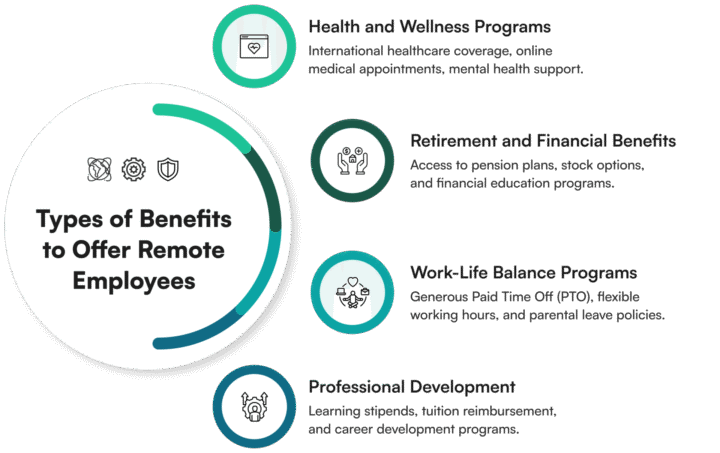Managing employee benefits is increasingly challenging, especially for businesses hiring workers across international borders. As companies expand globally, they are forced to navigate a range of legal, cultural, and administrative complexities in different regions.
In this article, we’ll break down the key questions that arise within the topic of remote employee benefits management:
- Which bonuses can companies offer international teams?
- Why effective benefits management is essential for agility?
- How do innovative strategies and tailored management services simplify this process?
Let’s start by defining employee benefits management.
What is Employee Benefits Management?
Employee benefits management reflects a company’s culture and competitive advantages, bolstering loyalty and securing remote talent retention.
Employee benefits administration pertains to the Human Resources (HR) Department. The HR benefits administration translates into a package of offerings spanning from dental and vision insurance to retirement plans, such as 401(k) and Lifestyle Spending Accounts (LSAs).

Types of Benefits to Offer Remote Employees
International healthcare coverage, online medical appointments, mental health support.
Access to pension plans, stock options, and financial education programs.
Generous Paid Time Off (PTO), flexible working hours, and parental leave policies.
Learning stipends, tuition reimbursement, and career development programs.
Why Effective Benefits Management is Critical for both Companies and Remote Workers?
Outsourced and remote personnel, often operating from various regions, are attracted to bonuses that address their specific needs, improving their well-being and ability to travel. This makes employee benefits administration crucial, especially in the era of digital nomads.
For businesses aiming to support global teams, as well as to reinforce their engagement, diversifying employee benefits is a powerful step. Studies show that the productivity and success of the talent whose perks meet their needs link directly to increased company performance.
Moreover, a well-structured benefits package, especially a highly competitive one, including a health insurance, a mental wellness program, and professional development opportunities can dramatically elevate the employee experience and lead to higher retention rates.
Employee feedback data indicates that 70% of remote workers prioritize flexible benefits over fixed packages. Our analysis shows that companies implementing customizable benefits programs see a significant improvement in talent attraction. The ability to tailor benefits to individual needs has become a key differentiator in the global employment market.

Challenges in Managing International Workers Bonuses
Legal and Regulatory Compliance
A major challenge in managing benefits is understanding the web of labor laws across countries. Every country perceives work legislation in their own way – from healthcare requirements and retirement contributions to specific tax regulations. Take Europe, for example, where businesses are often required to provide more generous parental leave than in the U.S. These varying regulations request specialized knowledge and tools for efficient HR benefits management.
Staying compliant with these rules is important to avoid legal troubles, penalties, or even lawsuits. To simplify this, using benefits management services that focus on international teams help businesses navigate the red tape, ensuring compliance, while offering customized and competitive bonuses.
Accounting for Cultural Differences in Benefits
Cultural differences significantly impact how contractors perceive benefits. What’s seen as a perk in one region won’t be valued as much elsewhere. For example, U.S.-based workers might prioritize welfare coverage, whereas Europeans could value work-life balance and time-off more. Offering a standard package may frustrate the international team. Therefore, your employee benefits administration strategy has to accommodate all the differences.
Localization ensures that your benefits management resonate with your personnel, no matter where they are. It is a constructive and holistic way to show them that you understand and care about their unique needs.
Tackling Currency and Exchange Rate Variability
Managing salaries and bonuses across currencies makes benefit management more intricate. Exchange rate fluctuations can disrupt compensation, creating inconsistencies. To maintain fairness and transparency, businesses need to stay on top of these changes.
Assisting with such purposes is the benefits management software. These technologies were developed to help businesses automate payments, track exchange rate shifts, and ensure that compensation across international teams remains balanced and fair.
Effective Employee Benefits Management Solutions and Practices
Ultimately, in outsourcing, employment laws, regional tax regulations, cultural distinctions, different access to healthcare systems, currency fluctuations, and personalized requests are stacked up against one another. With this array of variables, managing employee benefits becomes more elaborate. Here are some solutions and practices to ensure that you choose the right approach:
- Leveraging Benefits Management Software
HR benefits administration is an area that is currently being successfully automated with a variety of ready-to-use software. Digital tools for employee benefits management handle compliance, simplifying recruitment and onboarding processes. Through benefits management technologies, workers gain real-time access to their accounts, helping them understand and utilize what’s offered. Additionally, real-time analytics provide valuable insights into the performance of these programs, enabling companies to make necessary adjustments.
- Tailoring Benefits for Local Needs
As discussed, a one-size-fits-all benefits solution can’t cater to the specific needs of each region. For instance, health providers operate under different rules depending on their location. Health insurance plans for remote employees will differ significantly. One effective strategy for remote employee benefits management is localization and customization using benefits management software. These technologies help businesses tailor benefits packages, ensuring they align with unique characteristics of the social and economic environment. This level of personalization fosters a culture of flexibility and forward-thinking.
- Collecting Employee Feedback
Conducting surveys and utilizing analytics tools yield valuable insights into which perks workers appreciate and where improvements are needed. This data empowers organizations to refine their benefits management strategies, ensuring alignment with employee expectations. Research from the Society for Human Resource Management (SHRM) emphasizes that organizations prioritizing team feedback tend to have more effective benefits packages and higher employee satisfaction. This proactive approach creates open communication, demonstrating that the organization values workforce input.
Benefits Management Services and Benefits Management Company
When local and economic factors come to play, they require an in-depth understanding of local regulations and the distinct needs of a globally distributed workforce. Benefits management services play a pivotal role in ensuring seamless administration of employee benefits because they rely on data, have experience working in those areas and ability to foresee the tendencies.
Global Employer of Record (GEOR) makes Employee Benefits Management Straightforward
Partnering with an experienced benefits management company allows companies to offload the complexities of managing cross-border compliance, addressing both regional and individual preferences. By utilizing services like GEOR, benefits management becomes smooth and efficient. The services handle everything from compliance with local laws to crafting region-specific packages that appeal to a diverse, global workforce.
Conclusion: The Future of Benefits Management for Remote Employees
As businesses continue to expand globally, the complexity of managing employee benefits will only increase. With the right benefits management strategies, companies can create a compliant program that meets the needs of their remote workforce.
Investing in benefits management services and employee benefits management software can help businesses stay ahead by automating administrative tasks, tracking compliance, and providing personalized bonuses packages for overseas employees. By focusing on compliance, localization, and feedback, businesses can ensure their offerings remain competitive and efficient.
With the right employee benefits management strategies and tools, your business stays compliant across borders. If you’re ready to simplify the process and provide your global workforce with tailored, competitive benefits, GEOR can help. Contact us today to learn more about how our services can support your growing international team and optimize your benefits management.




